As part of Autumn Ango with the Zen Community of Oregon, we are contemplating a text called the Eight Realizations of a Great Being. A text that some sources say is the last teaching that the Buddha gave. We are working with an interpretation by Thich Nhat Hanh edited by Hogen Bays, Roshi.
I want to start this reflection with a poem that was read to me by another Zen Teacher, Daniel Terrango during a sesshin he led here in Ohio a couple of weeks ago. I felt fortunate to get to sit sesshin with him, and to receive this poem. It’s one of those poems, at least for me, that I want to pass along.
I Was Reading A Poem By David Rutschman
I was reading a poem by Ryōkan about a leaf, and how it showed the front and the back as it fell, and I wanted to call someone — my wife, my brother — to tell about the poem.
And I thought that maybe my telling about the poem was the front of the leaf and my silence about the poem was the back.
And then I thought that maybe my telling and my silence together were honestly just the front of the leaf, and that the back was something else, something I didn’t understand.
And then I thought that maybe everything I understood and everything I didn’t were both actually just the front of the leaf — so that the totality of my life was actually just the front of the leaf, just the one side — which would make the other side my death. . . .
Unless my life and death together were really still only the front of the leaf?
I had left the branch. I was falling.
I was loose now in the bright autumn air.
Now the first realization.
All the world is impermanent. The earth is fragile and perilous.
The four great elements are both suffering and emptiness.
In the five skandhas there is no self.
Everything that arises, changes, and perishes, is illusive, unreal,
and without a master.
Thought is the root of suffering, The body a reservoir of desire.
Thus, observing and contemplating, one gradually breaks free from
birth and death.
Here in both the poem and realization—we are invited to really take up impermanence as a contemplation. In Buddhism impermanence is considered one of the marks of existence. My teacher Hogen Roshi would often say that these marks are part of what make a teaching, a dharma teaching, so he would encourage us to consider them whenever we gave a dharma talk.
The marks are:
Impermanence—insight into change, on the minute moment to moment level as well as on the level of our own lifespan, the lifespans of institutions, societies, world systems, the earth itself. This insight is to really see directly that all things are of the nature of change.
No-fixed-self—nothing is fixed, everything is in relationship, not a single thing or being exists independent of others. We interare, our nature is shared.
Dukkah/Nirvana—we suffer when we want things to be different then they are, whether that is trying to get rid of an experience we don’t want or trying to get more or hold onto to something that we do want, recognizing this we can discover through practice how to attune to the true nature of things as they are, which is interconnected, not-separate and flowing
The Buddha said: All the world is changing. We can not hold on to a single thing.
Even the earth itself, our home is fragile and perilous. The four great elements (water, fire, earth, air/wind) can cause suffering, but are empty in their nature (composed of other parts, interdependent, spacious).
How is this true in our experience? All the world is changing. Such a beautiful mantra. The poem I read in the beginning captures the beauty and mystery of a single leaf falling, and how in very real ways this is like our life, we are floating, tumbling, dancing, falling through space.
We are really bearing witness to the unreliable nature of the earth itself, how the lives humans built isn’t sustainable with the earth’s natural balance. And we are seeing the loss and destruction from these great hurricanes. I happen to have many acquaintances, friends and teachers who live in the Asheville area. There has been so much destruction, devastation and loss from the hurricane. Same too in Florida, in Nepal, in parts of Africa and Europe this year. All over the world beings are experiencing devastation, loss, pain and hardship due to Climate Instability—wildfires, smoke, floods, damaged water supplies, loss of housing and infrastructure—this is the world we live in now.
And, the Buddha gave this teaching before cars and planes and the industrial revolution. The earth has always been fragile and perilous, there have always been storms, volcanoes, fires, floods. Great forces of destruction rising up from the earth, from the great elements.
This contemplation of impermanence is an invitation to really look deeply into the nature of our experience. What happens when we allow the truth of impermanence to be here. What do we notice? How does attuning to impermanence, contemplating impermanence help us face the climate crisis? Does it?
I was listening to a podcast interview with Susan Murphy who is a Zen Koan Teacher from Australia. She writes on Zen practice and the Earth. One of her first books is called Minding the Earth, Mending the World and her most recent book is called A Fire Runs Through All Things: Zen Koans for Facing the Climate Crisis.
I want to share an excerpt from her book, for I feel it is a powerful meditation on how we contemplate impermanence and turn towards the climate crisis as part of our spiritual practice. She says:
The times are always uncertain until we cease longing for certainty, and only then do they become truly interesting. The planetary crisis we’re in together is now simply the given the strange, inarguable gift of what is. The fervent half-prayer of “Precarious!” overhears the realization that any escape is futile. Who now in good faith can dispute planetary heating and its appalling consequences and our drift toward civilizational suicide, ruined lands, biodiversity collapse, record-breaking megafires and megafloods, and new pandemics. And then there’s our shadow pandemic, too: panic, confusion, and conspiratorial rage, shadowed by dread, anxiety, and depression.
The planetary dangers that haunt us make our time an exquisite moment, piercing and inescapable. Also baffling to the point of provoking fresh realizations, hence the description of this time as a “gift” brimming with untested possibilities right along with potentially dire consequences. Dare we celebrate the way it stretches us, this strange privilege of being alive right now? Can we embrace the sheer lunacy of our moment, in which the biggest human “ask” in history up to now has chosen us?
A koan scandalizes all suppositions (literal, rational, empirical, neurotic) that hold up the shaky sky of human knowing and fearing, until the leaves blowing in the street, the wave welling over a rock, the eyelashes of the cow all share the same realm as this mind. The shock of this can stoke new depths of fiery, fiercely protective love for the Earth. With luck, this love is fierce enough to protect our home from the worst impulses in ourselves and turn them to good.
The ecocrisis of our time raises the question of the true nature of our human presence on the Earth as a koan that rightly exerts an almost overwhelming pressure on our hearts. It cannot be resolved, and the suffering it causes cannot be relieved without breaking through the paradigm that is so relentlessly causing it. Zen koans help us grow skilled in tolerating a precarious state of mind, and not turning away but growing curious instead. That we can’t go forward in the usual way becomes the strangely valuable offer of the moment. Not-knowing, in the spirit of improvisation, accepts all offers! And the Zen koan turns every obstacle into the way.
Take a despairing reaction like “There is nothing I can do to stop this disaster!” Looking beyond the ideas of “I,” and “stop,” and even the activity of “doing,” can we even dare to look deeply into the crisis and not-know what it is, or that it is so? Perhaps even disaster loses its power of impasse when scrutinized by a trusting form of productive doubt. Can something be done with less doing, using the calm inside the moments that can be created within an emergency when what is happening is met with not-knowing?
The way we have framed reality is plainly out of kilter and out of date. Koan mind breaks the rigid frame and makes an ally out of uncertainty, asking it to be our guide in the darkness.
Every koan has a bit of the apocalyptic about it, lifting the veil that this dream of a separate self throws over the wholeness of reality. Apocalypse implies destruction of a world, but hiding in that word is the older meaning, that of a necessary revelation, a veil torn away, leaving no choice but to see what is hidden from us in plain sight.
Crises shape and transform us all our lives. The limitations that grow apparent to a crawling infant become the seeming unlikelihood of learning to walk. Impasse is the unavoidable opportunity to see beyond expectations, suppositions, and impossibilities as they crumble before our eyes. Crisis, whether at the vast or intimately personal level, is what reveals that there is no “normal,” despite all strenuous efforts to coax one into being. Not-knowing is relaxing into trusting this.
…
To truly contemplate impermanence invites us into this kind of not-knowing and opens the creative potential of any given moment. Because this is not fixed in place, we are not fixed in place. The world, our minds, our hearts are malleable–are flowing. And these words are just dead words until we really allow ourselves into the inquiry. The living contemplation—what am I? What if anything stays the same? What is my actual experience of change?
Zen celebrates responsiveness, a responsiveness that comes from un-fixing ourselves from our fixed beliefs about how things should be, which actually allows us to respond to what is.
We suffer impermanence because we expect it to be otherwise. We try to create structures, systems that will be reliable, predictable, and unchanging. We have cultural values that try to hide aging, death, disability, trauma—anything that pokes a hole in the narrative of stability and progress.
So much of our systems, and therefore our thought processes, are not built on basic principles of how the world actually is, how life actually is. What would it look like if we lived rooted in this first realization: everything is changing, life is uncertain?
What systems or structures or basic principles would we instill in our society if we really embraced the truth of change, transformation, death/rebirth, impermanence? As well as an understanding that we are interdependent, there is no I separate from you, this great earth, the creatures who live here, the plants, animals, rivers and each human being.
So how do we practice impermanence?
In meditation or in our direct experience outside of meditation we can tune into the constancy of change. Notice, really notice how the sensations in your hand change, if you really look, is there a single sensation that stays the same moment to moment? We can explore the direct experience of what I like to call radical impermanence—by exploring the changing nature of our sensory environment, the components of experience that make up our sense of self. Notice, how long does a single thought last? Can you grab hold of a thought? Do thoughts have a beginning, middle and end? What about emotions or feelings? Sounds?
As we explore our experiential experience in this way, a real question can arise—what if anything remains? What continues? This kind of inquiry isn’t meant to be done once, but is an on-going practice. How quickly do assumptions and predictions take over and have us believing again that we are permanent, solitary, independent and alone—and that our beliefs are unquestionably true?
As I practice with impermanence, I have come to appreciate that change is beautiful, its necessary, the constancy of change allows each moment to arise fresh—never before seen or experienced. When the mind isn’t dragging the previous moment onto the present, or reaching out for some future experience where we are redeemed or destroyed—what is this?
It is also quite rich and worthwhile to take this contemplation of impermanence into our interpersonal relationships and our connection to life on earth or in this world.
Grief, anger, rage, disappointment, sadness, numbness, confusion, despair are all companions of loss. If we learn to sit with and accompany these emotional responses with compassion and curiosity—they become part of the inner/shared journey on the realization of impermanence. They teach us what it is like to sit at the threshold of not-knowing, to find acceptance in the midst of whatever is happening, to find our way back to a love that is greater than fear.
Some people are elders in impermanence, for they possess a wisdom that is gained through weathering loss. These people aren’t necessarily old in years, but often the wisdom of loss does come with age—as we keep meeting the various uncertainties of life, the crisis points as Susan Murphy calls it, the moments of loss or change, be it the death of a loved one, a natural disaster in our town, war, loss of work, illness, accidents, injury, or living in a body that is aging—as we encounter impermanence with a learning attitude, insight deepens, gratitude grows, the waves of grief become waters we are more familiar navigating and perhaps we deeper our capacity to help others through them.
Impermanence presents us with the koan that rests at the center of our lives as mortal beings—what are we? What is this life? What is death? Koans as Susan Murphy says, make us uncomfortable. If reading this first realization makes you uncomfortable, there is something here for you to deepen into, to stay with…
We have two prayers in Zen that are prayers of impermanence, reciting them helps us turn towards and embrace the uncertainty of this life—to gain traction or companionship as we move through this changing world.
The Five Remembrances
I am of the nature to die, I can not escape death
I am of the nature to have ill health, I can not escape having ill health
I am of the nature to age, I can not escape
All that is dear to me and everyone I love are of the nature of change, I can not escape being separated from them
My deeds are my closest companions, I am the beneficiary of my deeds, my deeds are the ground on which I stand.
Verse of the Diamond Sutra
A star at dawn, a bubble in a stream, a flash of lightning in the summer sky,
A flickering lamp, a phantom and a dream
So is this fleeting world…
This writing is a draft of the dharma talk podcast you can listen to. At the end of the talk a sangha member offered a stanza from Mary Oliver’s In Blackwater Woods as a capping phrase.
To live in this world
you must be able
to do three things:
to love what is mortal;
to hold itagainst your bones knowing
your own life depends on it;
and, when the time comes to let it go,
to let it go.
I’m Amy Kisei. I am a Zen Buddhist Teacher, Spiritual Counselor, budding Astrologer and Artist. In my Spiritual Counseling Practice, I practice at the confluence of spirituality and psychology, integrating mind, body and spirit. I am trained in Internal Family Systems (IFS), Dream Work, Hakomi (Somatic Therapy) and Mindful Eating. Below are some of my current offerings.
I currently accepting a couple of new clients if you or anyone you know is interested in Spiritual Counseling.
Monday Night Meditation + Dharma
Every Monday 6P PT / 9P ET
Join me on zoom for 40 minutes of meditation and a dharma talk. We are currently exploring a text called The Eight Realizations of Great Beings, which gives us an opportunity to practice inquiry and embodying love as we discover our Awakened Nature together.
This event is hosted by the Zen Community of Oregon. All are welcome to join. Drop in any time.
Sky + Rose
What is it? An experiment in the impossible task of excluding nothing and loving everything. An alchemy of play, presence and wandering into the shadows, you could say.
Sky & Rose is a practice container that will:
Center group parts work practices to explore the fluidity, span and dream of who we are - somebody, nobody, everybody. You will be invited to express yourself vocally and physically, engage your imagination and play outside habituation.
Do interpersonal and group meditation practices of seeing, being and awakening.
Directly explore emotional embodiment & shadow work
Include Beauty, Art & Wonderment as core practice elements
Through rituals of imagination, meditation technologies and co-created fields of intentional play, we can slip out, for a time, of confining identities defined by our histories, culture and comfort.
Delivered by these practices, we can begin to inhabit perspectives and modes of being that stretch our sense of the possible and refresh our sense of the everyday.
You might find yourself wearing Luminosities face or inhabiting Laughter’s chest. Together we might try out Venus’s view of the very life we live or we might make space to feel Chaos's dance and shake off some rigidity.
All of these are just examples of where our wondering and feeling into places of vitality and expansion may take us.
We will rebel against the quotidian and respect ourselves too much to only have crumbs of the sacred!
It was also be a time to work together with the challenges to living heart forward with sanity and presence within this hyper-fractured funhouse/madhouse world.
Sky and Rose is a place for Jogen and i to invite you into practices and explorations of 'soul work' that are not part of the Buddhist tradition but that have nonetheless been sources of growth and joy for us. Our influences in this include Paratheatre, IFS and Voice Dialogue, Hakomi, Process Work, Butoh, Jungian dream work and more.
We initiate Sky & Rose as an experiment in embracing Spirit and Soul simultaneously, together imagining and practicing interpersonal liberation, playfulness and spaciousness in this time of deep adaptation.
Meets monthly on Sundays from 10:30A PT - 12:30P PT / 1:30P ET - 3:30P ET
Join us for our Opening Ritual + Practice exploring
The Ritual of Liminality
Sunday October 27
I currently live in Columbus, Ohio with my partner Patrick Kennyo Dunn, we facilitate an in-person meditation gathering every Wednesday from 7P - 8:30P at ILLIO in Clintonville through Mud Lotus Sangha. If you happen to be in Columbus, feel free to stop by. We have weekly meditation gatherings and monthly Saturday offerings as well.

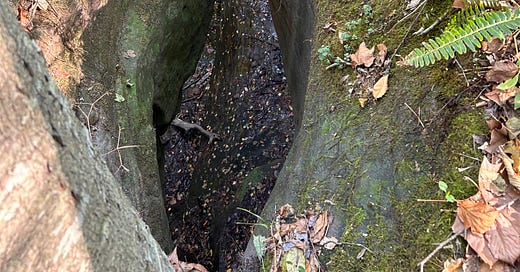
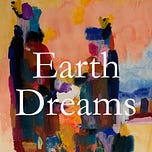



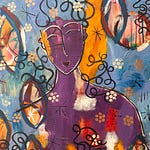

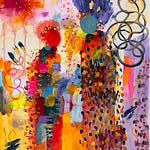

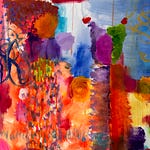
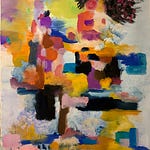
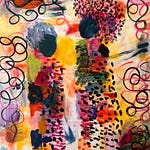
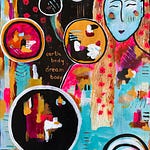
Share this post